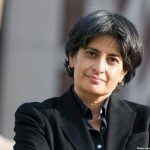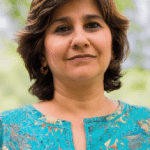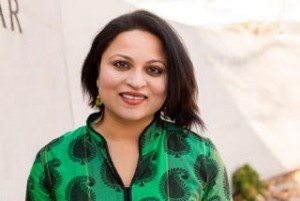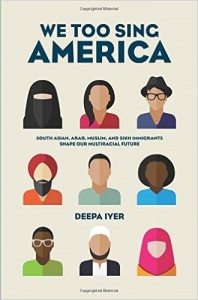2619 people reached on Lassi with Lavina
Sendhil Revuluri, Chetna Singh and 25 others like it on FB
Update: Kamala Harris, Indian-American lawyer, attorney general of California is now the first Indian-American woman to be elected US Senator in the 2016 elections!
Vanita Gupta is now President and Chief Executive Officer of the Leadership Conference on Civil and Human Rights.
This story was written in 2016. Updated in 2017.
Indian-American Women Lawyers Raise the Bar
Last year Raja Rajeswari made news when she became the first Indian woman – and first South Asian woman – to be appointed a criminal court judge in New York.
As she noted, “New York is multicultural and multi-ethnic. The fact that there are only two judges, the fact that there were no women judges, is not okay. I want to ensure that the multi-ethnic population that forms the foundation of New York City is treated fairly and provided access to resources including language interpreters early and often in the process.”

Rajeswari who is a graduate of Brooklyn Law School, opted to join the District Attorney’s office in Staten Island, working in several bureaus including Criminal Court, Narcotics and Sex Crimes, and the Special Victims bureau where she convicted Carlos Rosario of raping children and videotaping hundreds of other children.
Another Indian-American lawyer who’s been appointed judge is Sabita Singh, Judge of the District Court in the Commonwealth of Massachusetts, and she is the first South Asian judge in its history. Singh graduated from Boston University School of Law and specialized in white collar criminal defense in a major law firm in Boston. Singh has also served as a Prosecutor in the US Attorney’s office in Boston, focusing on human trafficking cases. Some noted cases that had the public riveted were the Eddie Brien juvenile murder case and the Louise Woodward baby murder case.
And now comes the news that Ushir Pandit, Senior Assistant District Attorney, Queens DA, has just been nominated as a Judge for the Queens County Civil Court in New York.

[dropcap]R[/dropcap]ippi Gill, the President-elect of the South Asian Bar Association of New York (SABANY) feels that tremendous strides have been made by women lawyers but there’s a long way to go yet. “While various studies over the last decade have shown that over 40 percent of law school graduates are women, we have yet to see those percentages correspond to equality in the workplace,” she says. “Women still earn less than men for equal work across industries and in law, and women remain severely underrepresented at the equity partner level at large law firms, as well as in the judiciary.”
In fact, that is one of the reasons that SABANY has formed a Women’s Committee to support the advancement of women in their careers through professional development, mentorship and networking opportunities.
Indeed, a law degree has been the avenue for a number of Indian-American women who have done very well for themselves in corporate America and private legal practice. It has also been the building block for a handful of strong women who have entered public life via this route as judges, attorney generals and lawyers in the public sphere, this having an impact on the lives of ordinary citizens.
Taking a stroll backward in time, Rachel Kunjummen Paulose, who was born in Kerala, became the first Indian-American to be nominated by the US president and confirmed by the US Senate to serve as a US Attorney. She became the youngest person, the first Asian American and the first woman to lead the District of Minnesota. Another name from the past is Cathy Bissoon who was the first Indian-American to be a judge in the US District Court for the Western District of Pennsylvania.

[dropcap]O[/dropcap]ne of the early legal trailblazers – male or female – was Preeta Bansal, the first Indian-American to argue a case in the US Supreme Court, and the first Indian American woman law clerk on the US Supreme Court. In fact, Then she was the only South Asian Americans in her Harvard Law School class of 550 students. She was the youngest ever Solicitor General of the State of New York. Appointed by the NY Attorney General in 1999 at the age of 33.
She became a Commissioner and then Chair of the US Commission on International Religious Freedom.
During the Obama-Biden Transition, she led the legal personnel team. While working in the Obama White House as General Counsel & Senior Policy Advisor at OMB, she initiated and saw through completion the production of the first White House report on the Status of Women since 1963 – when Eleanor Roosevelt did one for President Kennedy. The Report, Women in America, can be found at http://www.whitehouse.gov/administration/eop/cwg/data-on-women
She is currently a lecturer at the Massachusetts Institute of Technology (MIT) Media Lab and a Senior Advisor at MIT’s Laboratory for Social Machines. She is also President of Social Emergence Corporation, a not-for-profit which focuses on empowering community relationships. Just this September she was appointed to President Obama’s Advisory council on community partnerships.

And yes, we already have Kamala Harris who is of Indian and African-American heritage and has been the Attorney General of California since 2011. If all goes well, the community may very well soon have its first Indian-American senator too! Harris is now running for the US Senate seat that is being vacated by Democrat Barbara Boxer in the 2016 election, and is one to watch in the upcoming elections. (See update)
Her sister Maya L. Harris is a public policy advocate, who has been appointed to be one of three senior policy advisers to lead the development of an agenda for Hillary Clinton’s presidential campaign. Previously she was Vice President for Democracy, Rights and Justice at the Ford Foundation and the Executive Director of the American Civil Liberties Union (ACLU) of Northern California.

[dropcap]A[/dropcap]nother lawyer who has consistently made news for her bold moves is Vanita Gupta. Her first case, fresh out of law school and working with the ACLU, changed the lives of 35 mostly blacks who had been convicted on cocaine possession charges and sentenced for 60-300 years. This was almost 10 percent of the 5000 population of the small town of Tulia in Texas. She managed to overturn their convictions and helped to negotiate a $ 6 million settlement for them, as well as have the drug task force responsible for this miscarriage of justice disbanded.
She began her career as a lawyer with the NAACP Legal Defense and Educational Fund. In addition to her work with the ACLU and NAACP Legal Defense Fund, Gupta has taught civil rights litigation and advocacy clinics at New York University School of Law since 2008. She received a B.A., magna cum laude, from Yale University and J.D. from New York University School of Law.
Gupta is currently the Principal Deputy Assistant Attorney General and Acting Assistant Attorney General for the Civil Rights Division. “Vanita has spent her entire career working to ensure that our nation lives up to its promise of equal justice for all,” said Attorney General Holder in announcing her appointment. “Even as she has done trailblazing work as a civil rights lawyer, Vanita is also known as a unifier and consensus builder.”

[dropcap]O[/dropcap]ther Indian lawyers making an impact are Anjana Samant who is the Assistant Attorney General, Civil Rights Bureau in the office of the Attorney General of the State of New York; Sujata M. Tanikella is an Assistant Attorney General at the New York State Office of the Attorney General, where she conducts investigations and brings suit against companies and individuals that are defrauding the government; Neha Dewan is the Deputy Director and General Counsel at the Mayor’s Office of Appointments. She also serves as the Secretary of the New York Affairs Committee at the New York City Bar Association, and was elected the Secretary of the New York Democratic Lawyers Council, an organization dedicated to voting rights issues.
Anurima Bhargava is the Chief of the Educational Opportunities Section of the Civil Rights Division at the U.S. Department of Justice. She earned her law degree from Columbia Law School and graduated magna cum laude from Harvard College. she was earlier the Director of the Education Practice at the NAACP Legal Defense Fund.
Ask her about the rewards of working to provide equal opportunities to all students by enforcing federal statutes, she says: “Every child must have an equal opportunity to get an education. We seek to protect the civil rights of the most vulnerable students, so that they feel welcome and safe in school. To help students learn – regardless of their race, religion, gender, or disability – and provide the support they need to thrive and succeed, is rewarding for us all. It is a privilege to help build a foundation for all our children to stand on.”
Amrit Singh (Prime Minister Manmohan Singh’s daughter) is a human rights lawyer for the National Security and Counterterrorism program at the Open Society Justice Initiative and was formerly a staff attorney at the ACLU’s Immigrants’ Rights Project. She directs a program that conducts litigation and advocacy on national security-related human rights abuses across the globe. She is Counsel, among other cases, in al Nashiri v. Poland and al Nashiri v. Romania, lawsuits brought on behalf of Guantanamo prisoner Abd al-Rahim al-Nashiri before the European Court of Human Rights that challenge the role of Poland and Romania in the CIA’s secret detention program. She is also the author of ‘Globalizing Torture: CIA Secret Detention and Extraordinary Rendition.’
Some noted Indian-American lawyers have also become strong advocates and activists for human rights and marginalized people.

[dropcap]U[/dropcap]rvashi Vaid is an attorney and organizer who has played a leadership role in the lesbian, gay, bisexual and transgender (LGBT) and social justice movements. She started her social justice work as a staff attorney at the National Prison Project of the American Civil Liberties Union (ACLU) where she initiated the group’s work on HIV/AIDS in prisons. She is founder of LPAC, the lesbian SuperPAC; a co-founder of the Creating Change Conference and also the author of several books. she is the author of several books. As CEO of Vaid Group LLC, she works to address inequalities based on sexual orientation, race and gender.
Mallika Dutt is an award-winning human rights activist and the founder and president of Breakthrough, a human rights organization. She is also a co-founder of Sakhi for South Asian Women, a women’s rights group and has made gender equality and fairness central to her work. Dutt graduated from NYU Law School, received a Masters in International Affairs and South Asian Studies from Columbia University, and an A.B. in International Affairs from Mount Holyoke College. As speaker and commentator she recently moderated a panel on gender on the role of men in ending violence against women, at the Clinton Global Initiative.
As a writer Dutt wrote in an op-ed in Time online: “Boys will be boys”–at what cost? Boys are not robotic rapists, any more than girls are ornaments and objects for their aggressions. Let’s stop saying that half the human race is inherently aggressive, predatory and incapable of transformation.”

[dropcap]S[/dropcap]o how important is it for Indian-American women lawyers to be involved in the public law and justice arena?
Dutt believes Indian-American women can play an important role. “The American legal system has historically been a critical space for establishing human rights for multiple communities and Indian Americans have benefited from many of these struggles,” she says. “When I co-founded Sakhi 25 years ago, Indian American women in the law played an essential role in protecting women. Now that we have a larger voice in the future of this country, it’s even more important for us to have a voice in law and policy.”
Another attorney who’s had a lot of impact on the South Asian community in America is Deepa Iyer who for 10 years headed South Asian Americans Leading Together (SAALT) to strengthen the South Asian communities post 9/1. Her new book is “We too Sing America: South Asian, Arab, Muslim and Sikh Immigrants Shape our Multiracial Future”. She is currently a Senior Fellow at the Center for Social Inclusion, and serves on the Board of Race Forward.
[dropcap]”I[/dropcap]ndian American women lawyers are part of a growing segment of attorneys of color in the legal system,” she says. “For my own part, being an immigrant and a woman of color has shaped my interest in advocating around civil and immigrant rights issues. Lawyers who work in the public interest sector like Purvi Shah (at the Center for Constitutional Rights) or Alina Das (New York University Law School’s immigrant rights clinic), for example, are leading the way in changing the criminal justice and immigration systems in our nation.”
Asked about how the perception of Indian-American women in law has changed over the years, Preeta Bansal who has served in both the Clinton and Obama administrations, says it’s more the perception by Indian American women themselves that has changed, and of their own role in American society.
“Even 15 years ago, when I became New York Solicitor General, the first-generation Indian American community in the US was focused on technology, medicine, and engineering, and brought to the US a perception of government and law that they imported from their home country, where institutions of government were perceived by them to be bureaucratic, stultified, mediocre and often corrupt,” says Bansal.
She feels the community wasn’t interested in supporting the legal achievements by young Indian-American women nor were focused on social justice issues. She adds: ” The early legal trailblazers helped change that in part, and the current group of successful Indian American women lawyers is impelled forward by their own abilities, passions and commitments to justice, as well as supported by a more evolved and sophisticated community.”
Indeed, each of these Indian-American women have used their law degrees as the structural scaffolding to make a powerful difference in the lives of citizens in America.
Perhaps Anurima Bhargava speaks for many of them when she says: “We are all uniquely positioned to represent and translate the needs of our communities, especially for those among us who do not have a voice. It is critical that we engage in the fight for civil and human rights, and for the dignity and respect that must be accorded to our families and our communities. For generations, women have reached across boundaries and built coalitions across class, race, religion, and nationality; for us all to move forward, that tradition must continue.”
(C) Lavina Melwani
(A shorter version of this article first appeared in the HIndu )







2 Comments
Raja Rajeswari, thank you! This article started as a story about you being elected judge and while researching I found there were just so many inspiring women in law. I hope it will motivate many young women to look to serving in the public sphere!
Dear Lavina,
Congratulations! I just read your article and I am humbled and honored to be among all these inspiring women. Your article has touched on so many different avenues that are available for women of South Asian descent to enrich and empower their communities by their service. Thanks again for your dedication and patience in putting together this article. I am forwarding it to my family and friends around the world to share my pride about my fellow sisters and recognize their service.
Raja Rajeswari